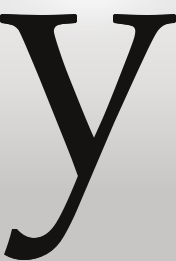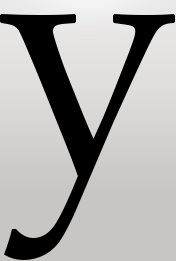[Top][All Lists]
[Date Prev][Date Next][Thread Prev][Thread Next][Date Index][Thread Index]
Re: [ft] CFF outline rendering problem
|
From: |
Werner LEMBERG |
|
Subject: |
Re: [ft] CFF outline rendering problem |
|
Date: |
Tue, 05 Oct 2010 18:58:14 +0200 (CEST) |
>> >> When rendering glyphs with cff outlines (otf, pfb fonts) the
>> >> control points which are located under the baseline are
>> >> connected with straight lines, for ttf fonts all the glyphs are
>> >> rendered correctly. This problem occurs only when I use direct
>> >> rendering with the FT_RASTER_FLAG_DIRECT flag, if I render the
>> >> glyph to a bitmap with FT the problem doesn't occur.
>>
>> Indeed, it was a bug, caused by a small thinko. It is now fixed in
>> the git repository; please test.
>
> I have tested it and it works. All the glyphs rendered with
> FT_RASTER_FLAG_DIRECT flag look the same as if they were rendered
> onto a bitmap.
Unfortunately, this isn't true. Compiling the attached example4.cpp
and comparing
./example4 /windows/C/WINDOWS/Fonts/pala.ttf y 200 0
(image `not-direct.png') with
./example4 /windows/C/WINDOWS/Fonts/pala.ttf y 200 1
(image `direct.png') you can easily see rendering differences. In
particular, the direct rendering is not correct, producing too wide
images. Reason for the mismatch are negative x and y coordinate
values in the data fed to the smooth renderer, I believe, causing
rounding errors. In non-direct `mode', the outline is first shifted
to have no negative coordinates so the problem is not seen.
Graham, since you've analyzed the code in great detail, could you have
a look? Maybe you can find the problematic spot(s) much faster than
me...
> [about main.cpp, now called example4.cpp]
> Of course, you can use it any way you want.
Thanks a lot!
Werner


// example4.cpp
// This file holds the source code of a very simple application using the Qt
// framework to render a single glyph into a window. For demonstration
// purposes, both direct rendering using a callback and rendering using a
// buffer are implemented (yielding the same output).
//
// Due to a bug in the FreeType's direct rendering support you should use
// version 2.4.3 or newer to get correct results.
//
// Written Sept. 2010 by Róbert Márki <address@hidden>,
// with slight modifications by Werner Lemberg
//
// Public domain.
//
//
// To compile this application, check the `example4.pro' proto-makefile
// whether all paths are fine, then say `qmake example4.pro' followed by
// `make'.
//
// It has been tested with Qt version 4.7.0.
#include <QtGui/QApplication>
#include <QWidget>
#include <QPainter>
#include <QFile>
#include <QImage>
#include <iostream>
#include <ft2build.h>
#include FT_FREETYPE_H
#include FT_GLYPH_H
#include FT_TYPES_H
#include FT_OUTLINE_H
#include FT_RENDER_H
QString g_usageText =
"usage:\n"
"example4 FONT_PATH CHARACTER SIZE DIRECT_RENDERING_MODE(1|0)";
#define TRUNC(x) ((x) >> 6)
class Widget : public QWidget
{
Q_OBJECT
public:
Widget(const QString& fileName,
QChar character,
int pointSize,
bool directRender,
QWidget *parent = 0)
: QWidget(parent), m_directRender(directRender)
{
FT_Error error = FT_Err_Ok;
m_face = 0;
m_library = 0;
// For simplicity, the error handling is very rudimentary.
error = FT_Init_FreeType(&m_library);
if (!error)
{
error = FT_New_Face(m_library,
fileName.toAscii().constData(),
0,
&m_face);
if (!error)
{
error = FT_Set_Char_Size(m_face,
0,
pointSize * 64,
physicalDpiX(),
physicalDpiY());
if (!error)
{
FT_UInt glyph_index = 0;
glyph_index = FT_Get_Char_Index(m_face,
character.unicode());
error = FT_Load_Glyph(m_face,
glyph_index,
FT_LOAD_DEFAULT);
if (!error)
{
FT_Pos left = m_face->glyph->metrics.horiBearingX;
FT_Pos right = m_face->glyph->metrics.horiBearingX
+ m_face->glyph->metrics.width;
FT_Pos top = m_face->glyph->metrics.horiBearingY;
FT_Pos bottom = m_face->glyph->metrics.horiBearingY
- m_face->glyph->metrics.height;
m_glyphRect = QRect(QPoint(TRUNC(left),
-TRUNC(top) + 1),
QSize(TRUNC(right - left) + 1,
TRUNC(top - bottom) + 1));
setFixedSize(m_glyphRect.width(),
m_glyphRect.height());
}
}
}
}
}
~Widget()
{
FT_Done_Face(m_face);
FT_Done_FreeType(m_library);
}
private:
FT_Library m_library;
FT_Face m_face;
QRect m_glyphRect;
bool m_directRender;
// The callback function for direct rendering.
static void graySpans(int y,
int count,
const FT_Span_ *spans,
void *user)
{
QPainter *painter = (QPainter *)user;
y = -y;
for (int i = 0; i < count; i++)
{
const FT_Span span = spans[i];
qreal opacity = qreal(span.coverage) / 255.0;
painter->setOpacity(opacity);
if (span.len > 0)
painter->drawLine(span.x, y, span.x + span.len, y);
}
}
protected:
void paintEvent(QPaintEvent *event)
{
QWidget::paintEvent(event);
if (m_library && m_face)
{
FT_Error error = FT_Err_Ok;
QPainter painter(this);
painter.translate(-m_glyphRect.x(),
-m_glyphRect.y());
if (m_directRender)
{
// Direct rendering.
FT_Raster_Params params;
params.target = 0;
params.flags = FT_RASTER_FLAG_DIRECT | FT_RASTER_FLAG_AA;
params.user = &painter;
params.gray_spans = &Widget::graySpans;
params.black_spans = 0;
params.bit_set = 0;
params.bit_test = 0;
FT_Outline* outline = &m_face->glyph->outline;
FT_Outline_Render(m_library,
outline,
¶ms);
}
else
{
// Rendering using a buffer.
error = FT_Render_Glyph(m_face->glyph,
FT_RENDER_MODE_NORMAL);
QImage glyphImage(m_face->glyph->bitmap.buffer,
m_face->glyph->bitmap.width,
m_face->glyph->bitmap.rows,
m_face->glyph->bitmap.pitch,
QImage::Format_Indexed8);
painter.translate(m_glyphRect.x(),
m_glyphRect.y());
QVector<QRgb> colorTable;
for (int i = 0; i < 256; ++i)
colorTable << qRgba(0, 0, 0, i);
glyphImage.setColorTable(colorTable);
painter.drawImage(QPoint(0, 0),
glyphImage);
}
}
}
};
int main(int argc,
char **argv)
{
bool status = false;
if (argc == 5)
{
bool isSizeOk = false;
QString path = argv[1];
QChar character = *argv[2];
int size = QString(argv[3]).toInt(&isSizeOk);
bool directRender = QString(argv[4]).toInt();
if (QFile::exists(path) && isSizeOk)
{
status = true;
QApplication a(argc, argv);
Widget w(path, character, size, directRender);
w.show();
return a.exec();
}
}
if (!status)
{
std::cout << qPrintable(g_usageText) << std::endl;
return 0;
}
}
#include "main.moc"
// Local Variables:
// coding: utf-8
// End:
# example4.pro
QT += core gui
TARGET = example4
TEMPLATE = app
SOURCES += example4.cpp
MOC_DIR = ./moc
LIBS += -lz -lfreetype
INCLUDEPATH += $$MOC_DIR \
/usr/local/include \
/usr/local/include/freetype2
# EOF
